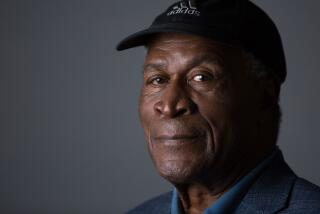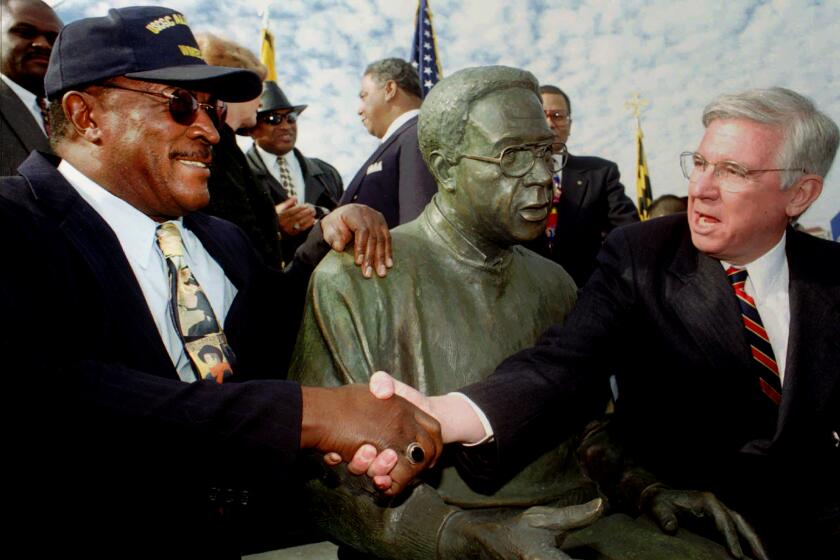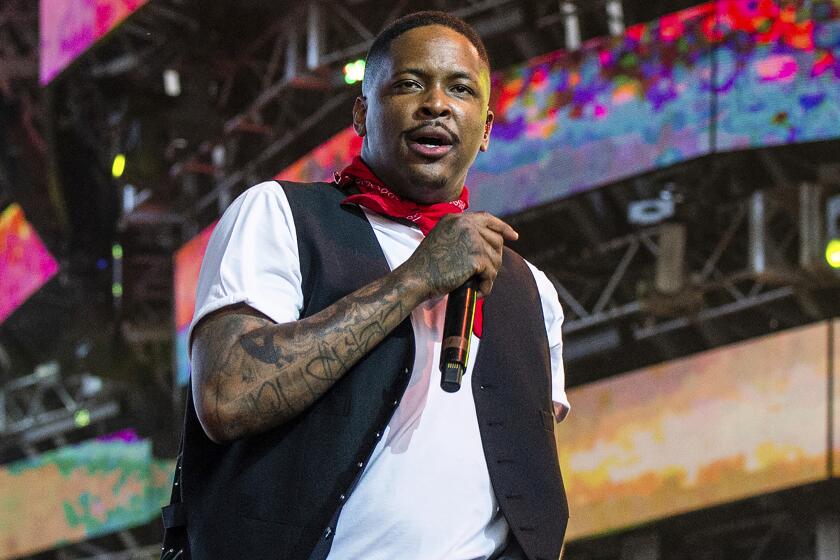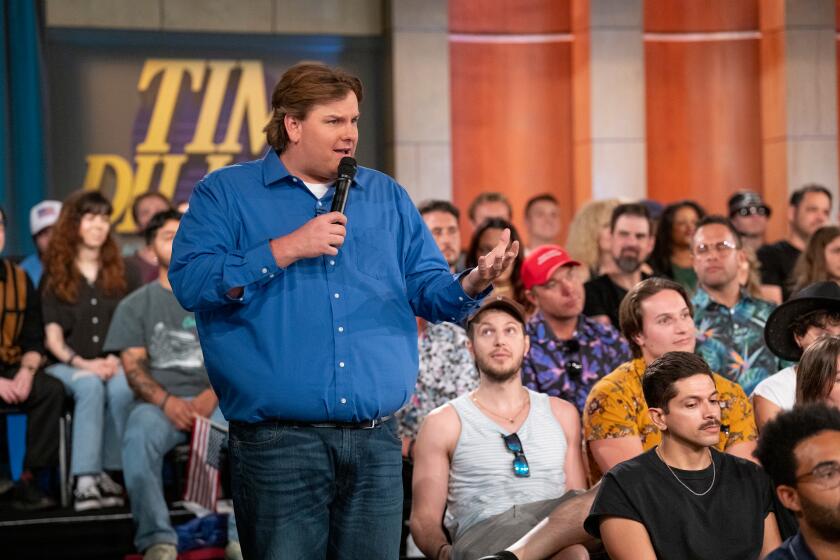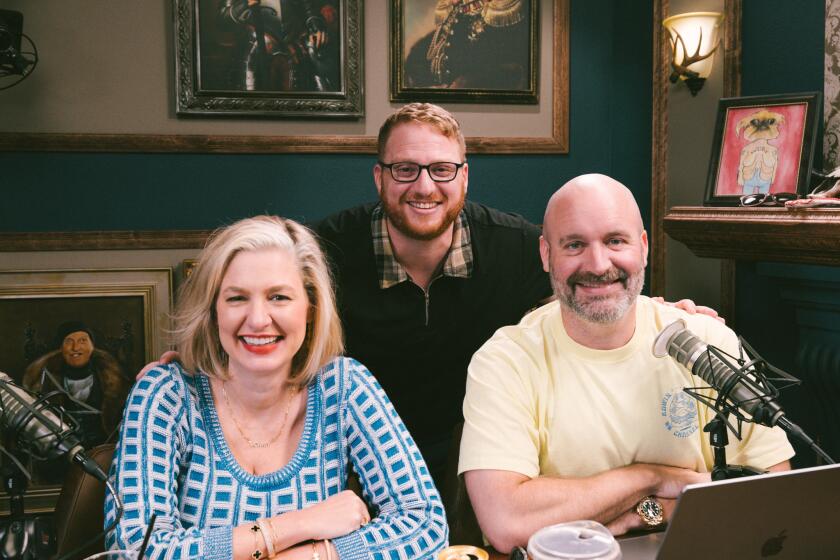Company Town : How to Turn the ‘P’ in PBS Into Profit
Private companies from Bell Atlantic to Jones Intercable are already stepping forward to volunteer that they might be interested in investing in the Public Broadcasting Service as Republican sentiment in Washington tilts toward ending PBS’ taxpayer subsidies.
So here’s a suggestion: Cut PBS loose as a free-standing, profit-earning network, making available to it a pool of network executives, programmers and producers who regularly supply the programs we see on the major networks.
Here are some of the possibilities that could both raise revenue and attract ratings:
1. Take a cue from ABC’s Super Bowl coverage.
The “PBS Doritos Pledge Breaks” would generate substantial revenue. Doritos packages would be prominently displayed at every phone bank.
2. Lure back former PBS stars who have gone on to make a lot of money they never would have made had they stayed on public television.
Former “This Old House” host Bob Vila could return and still be allowed to sell power tools for Sears.
Siskel & Ebert Inc. could still review movies and make a fortune selling their show.
PBS could run endless promos marking their return, as Channel 2 has done in welcoming back newscaster Jerry Dunphy.
3. Sign a production deal with producer Aaron Spelling.
Bob Vila could be linked up with the man behind “Beverly Hills 90210” and “Melrose Place” for a weekly series called “This 56,000-Square-Foot House.”
Each week, Vila could visit a different room in Spelling’s gigantic mansion near Beverly Hills, offering such money-saving tips as how to install a skylight to bring natural light into rooms devoted exclusively to wrapping gifts.
4. Let Fox take a crack at it.
One possibility is a weekly drama combining Fox’s hit movie “Speed” with the successful PBS show “Magic School Bus.” Lily Tomlin stars as the driver of the bus that can’t go under 50 m.p.h.
5. Take advantage of Disney dollars.
The service could charge Walt Disney Co. a $1,000 fee each time PBS film reviewer Michael Medved of “Sneak Previews” gushes that nobody but Disney knows how to make a decent family movie.
Charge $5,000 for every one of his blurbs used in a Disney movie ad.
6. Feature “based on a true story” documentaries.
Filmmaker Ken Burns would get launched on a 10-part documentary on O.J. Simpson. Sign Ford Bronco as the exclusive sponsor.
7. Get rid of the purple suit.
The computer wizards at Industrial Light & Magic, who made the Tyrannosaurus rex come alive in “Jurassic Park,” could give Barney a make-over.
8. Corporate tie-ins.
“Woolite Presents Mr. Rogers’ Neighborhood.”
9. License PBS music to advertisers.
“Can you tell me how to get, how to get to Sesame Street? Yes--in a new Dodge minivan!”
10. Make “Charlie Rose” more like “The Tonight Show.”
Rose would do a monologue before each show, although regular watchers of the host--who often has more to say than his guests--may not notice any difference.
11. Let market prices determine the price of premiums awarded to those who pledge money.
With government ties to PBS cut, those artificially low prices for premiums could finally come off. For example, instead of offering a CD of the “Three Tenors” concert at Dodger Stadium for a $150 pledge, the price might rise to $250.
*
Latest rap on Interscope: The future of Interscope Records has been decided for now.
Time Warner is about to become an equal partner in the controversial Westwood-based record label, home to such popular acts as Snoop Doggy Dogg and Nine Inch Nails.
Both parties declined to comment. But sources said founders Jimmy Iovine and Ted Field agreed this week to allow the New York media giant to complete acquisition of an additional 25% of the label for an undisclosed amount.
Time Warner’s Atlantic Group--which has owned 25% of Interscope since it was launched in 1991 at an estimated cost of $20 million--put a down payment on the second 25% share in late 1992 but had been dragging its feet on completing the purchase.
Interscope is one of the few new labels started in the ‘90s that has made a profit. Field and Iovine--who own the other 50% of the label--achieved success through deals with such cutting-edge operations as rap music producer Dr. Dre’s Death Row Records and Trent Reznor’s Nothing Records. Last year’s Interscope gross was more than $100 million domestically.
But the label has been a magnet for controversy, with some of its most talented stars dogged by run-ins with the law and their music and videos coming under fire from media watchdogs.
Last year, sources said Iovine and Field received lucrative buyout offers from several entertainment companies, including Sony and PolyGram.
Although negotiations are still in progress, sources said Warner is likely to be given until the end of 1996 to complete the purchase. Prior to this transaction, the price to acquire 100% of Interscope had been valued at $400 million, sources said.
*
Going global: The efforts of MCA Music Entertainment chief Al Teller to build up the company’s languishing international business appear to be working.
The company announced Thursday that its worldwide 1994 revenue broke the $2-billion mark for the first time, due in part to its international expansion. Sources said it was up about 25% from a year earlier.
Several other things helped. The company’s Geffen Records unit posted a record $505 million with CDs from such bands as the Eagles and the Black Crowes.
MCA’s country and black music operations continued to do well, and its rock act Live is selling well.
Also helping is the fact that MCA Music’s UNI Distribution Corp. distributes MCA’s videocassettes, which means the unit reaped the benefits of distributing the video version of Steven Spielberg’s “Jurassic Park.”
*
Chuck Philips contributed to this column.
More to Read
The biggest entertainment stories
Get our big stories about Hollywood, film, television, music, arts, culture and more right in your inbox as soon as they publish.
You may occasionally receive promotional content from the Los Angeles Times.

